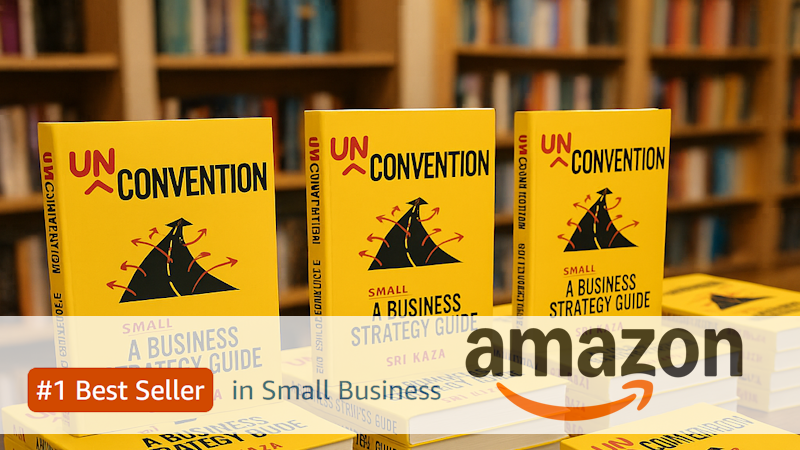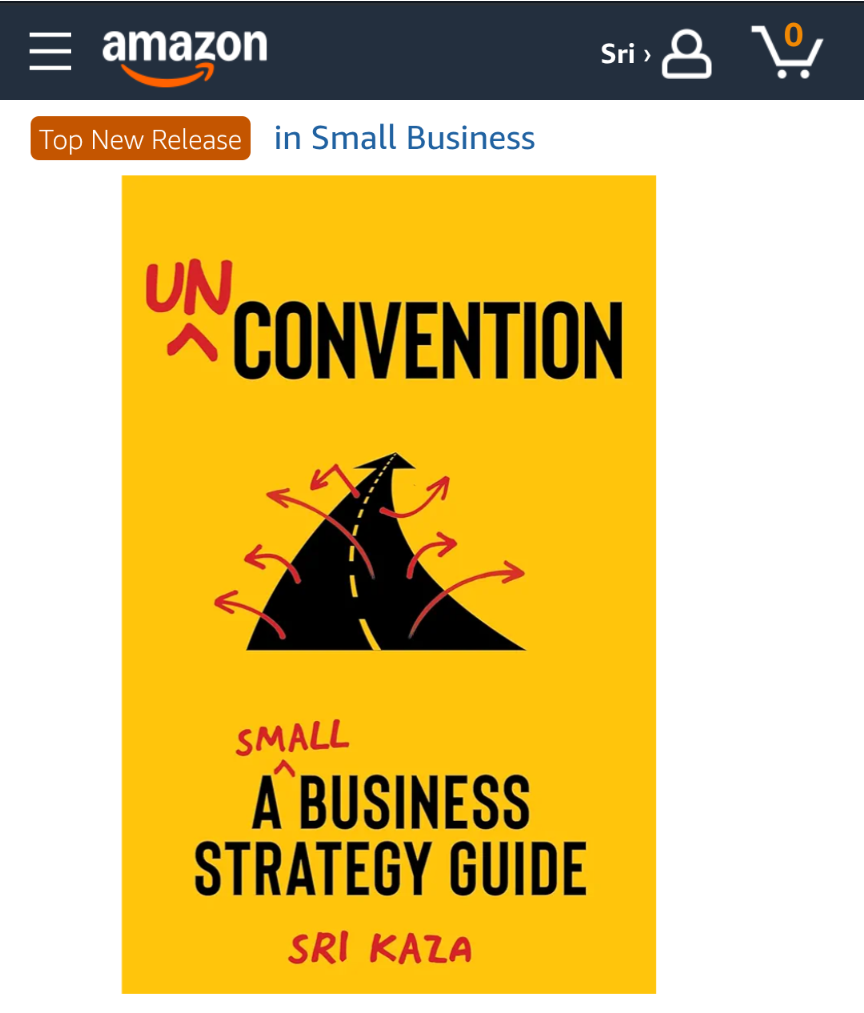Unconvention is Topping the Charts!
Thank You for Helping Make That Happen

September 10, 2025
On Monday, September 8th, something extraordinary happened. For a brief moment, Unconvention: A Small Business Strategy Guide reached #1 in Amazon's Small Business category, along with top spots in Leadership and Motivation. It was uniquely satisfying to see that the ideas had legs.
Since then, the book has settled into being one of Amazon's top new releases, maintaining strong visibility across multiple business categories.
These rankings change constantly, of course—Amazon's algorithms are always moving books up and down the charts. But for that moment, a book about embracing what makes small businesses different had risen to the top of a category filled with advice telling entrepreneurs to think bigger, scale faster, and copy what the corporate giants do.
There's something beautifully ironic about that.
What This Book Is Really About
Unconvention isn't another business book promising the "secrets" of billion-dollar companies. It's not about growth hacking, disruption, or becoming the next unicorn startup. Instead, it's about something much more fundamental: recognizing that small businesses have natural advantages that are often overlooked, undervalued, or actively discouraged by conventional business wisdom.
After spending years at McKinsey & Company working with Fortune 500 enterprises, then six years helping small business owners at ForwardLine Capital, I discovered something surprising. The small businesses that thrived long-term weren't the ones trying to mimic big corporations. They were the ones that embraced what made them fundamentally different.
I found three principles that set these successful small businesses apart—principles that are intrinsic to every small business, whether the owner recognizes them or not. I call them the Underdog Principles because, in a world where big businesses have deeper pockets, bigger teams, and more resources, small businesses start with what looks like a disadvantage.
But positioning, proximity, and purpose aren't disadvantages at all. They're competitive advantages waiting to be recognized and actively used.
The Three Underdog Principles
Positioning is the ability to serve a focused set of customers who value what makes you unique. While large corporations often need broad appeal—offering "vanilla" experiences to reach the masses—small businesses have the freedom to be any flavor they want. The neighborhood coffee shop that becomes the morning hub for local creatives. The specialty bike shop that draws serious cyclists from three counties away. These businesses succeed not by trying to please everyone, but by creating distinctive value for specific customers who truly appreciate what they offer.
Proximity is the deep understanding that comes from direct, personal interactions with customers. While big companies rely on data analytics and market research, small business owners see their customers' reactions firsthand, hear their concerns directly, and understand their needs in ways that go beyond any corporate analysis. This closeness allows you to solve problems others might not even recognize, extend relationships beyond transactions, and create experiences that only you can deliver.
Purpose is the freedom to build something meaningful beyond just making money. While large corporations are primarily accountable to shareholders for financial returns, small business owners can pursue both personal and financial objectives. This might mean the baker who prioritizes artistry over volume, the consultant who gives honest advice even when it means less revenue, or the shop owner who creates community gathering spaces. When your business reflects your values and vision, you create something that competitors can't easily copy—because they can't copy who you are.
Why These Principles Matter Now
In a world increasingly dominated by algorithm-driven experiences and corporate efficiency, customers are craving the human connection and authentic purpose that small businesses naturally provide. The businesses that recognize and leverage their underdog advantages don't just survive—they thrive by offering something that bigger competitors simply cannot replicate at scale.
Think about the businesses you choose to support personally. Chances are, it's not just about price or convenience. It's because they know you, they care about their craft, they stand for something you believe in, or they offer an experience that feels genuine in a way that mass-market alternatives don't.
That's the power of the Underdog Principles in action.
A Personal Thank You
Seeing Unconvention reach #1, even briefly, feels like validation not just for the book, but for every small business owner who has ever felt pressure to "think bigger" or "scale up" when what they really wanted was to build something sustainable, meaningful, and true to their values.
To everyone who ordered the book, shared it with others, or simply believed that small businesses deserve strategies designed for them rather than copied from corporate playbooks—thank you. Your support means more than you know.

Unconvention continues to maintain its position as one of Amazon's Top New Releases
The book officially launches on Tuesday, September 23rd, and I'm excited to see how these ideas resonate with the small business community. But more than that, I'm excited to hear your stories about how you're already using these principles, whether you called them by these names or not.
Because here's what I've learned after years of studying successful small businesses: you already have advantages that your biggest competitors would pay millions to possess. The question isn't how to get bigger—it's how to get better at being exactly the right size for the customers who need what only you can provide.
Thank you for making Monday morning's screenshot possible. But more importantly, thank you for proving every day that being small can be the biggest advantage of all.
Unconvention: A Small Business Strategy Guide is now available at Amazon and most other book retailers. Learn more about the Underdog Principles at sri-kaza.com.
Copyright 2026
Sri Kaza
